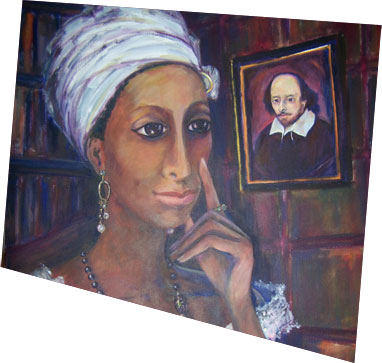In Search of Luce Morgan: The Dark Lady of Shakespeare’s Sonnets. Parts I-III
I became interested in Shakespeare’s Sonnets after reading ‘Black Women In Antiquity’ by Ivan Van Sertima in 2005.
In the book, Van Seritma identified the woman written in Sonnet’s 127-154. Before that, I had conflicting views on the writings of Shakespeare.
On one hand, I found the language archaic, and too much of a struggle to get my head around. On the other hand, I was curious to find out what influenced him to write stories with so many African characters.
Should I believe the media hype that people of African descent only started to settle in England during the late 1940s? Alternatively, was there an African presence in English society before European slavery was established and one, with which Shakespeare was familiar?
As I read the words in Sonnet 130, “If hairs be wires, black wires grow from her head.” I suddenly remembered my primary school days, in particular, comments directed to me by other children, who after touching my hair, would comment that my hair felt like Brillo pads; a wire-scouring pad made of steel wool.
I was enthralled to find that more than five hundred years earlier, Shakespeare had said almost the same thing about his lover’s hair. I wanted to know who the ‘Dark Lady’ of Sonnet’s 127-154 was. In addition, what was life like for her in Elizabethan London?
16th century, London was an unpleasant place to live. The streets became a dumping ground for every sort of filth: Human excrement, blood, animal carcasses, all littered the streets.
In those unhygienic conditions, all sorts of vermin thrived becoming a fertile ground for the bubonic plague. Smallpox, the Pox: a mixture of syphilis, and other sexually transmitted diseases, was also rampant in Elizabethan England.
Moreover, to add to the general stench and decay of daily life, people did not wash regularly, resulting in the louse borne disease, typhus. Water was another source of contamination, and everyone, including children drank ale.
For many reasons, the number of people living in abject poverty had increased and able-bodied people, who did not work, bore the brunt of the Poor Laws. Those laws meant that unemployed people were punished by branding, imprisonment or even death.
Only the sick, old, and disabled were legally permitted to beg. Moreover, as people struggled to survive, London became a magnet for people practicing all sorts of vices. Brothels and gambling dens thrived in the wake of changing religious and moral values, as did beliefs in astrology, evil spirits, and superstition.




